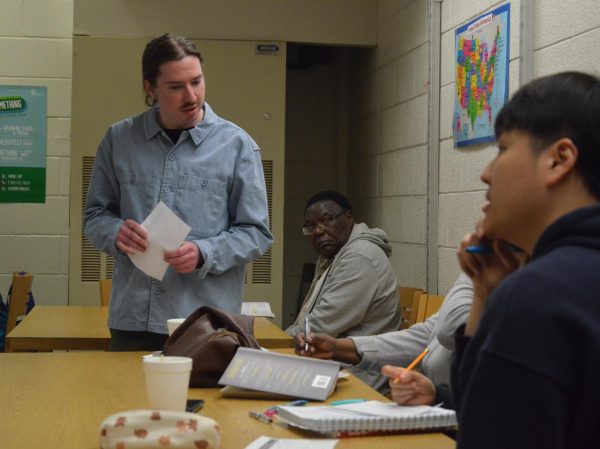Valuing equality in education
December 9, 2016
By Mei Nathan
After the ringing of the 8:30 a.m. bell, Grady teachers are expected to only permit students with tardy passes into their classrooms. While Atlanta Public Schools created the policy, Dr. Betsy Bockman, Grady’s interim principal, began enforcing the rules Sept. 19. Dr. Bockman said it was a larger issue of equality.
“Some teachers were letting the kids come into the class late, whereas some were sending them to get the late pass,” Dr. Bockman said. “I don’t feel like it was meant to be this way, but the kids that were in the cafeteria were kids of color [while] the number of late kids were pretty diverse.”
Dr. Bockman entered Grady knowing that APS Superintendent Dr. Meria Carstarphen wanted to emphasize a more equitable classroom environment, and hopes to redesign class sizes and demographics.
“I wouldn’t do it solely based on race,” Dr. Bockman said. “You don’t want to move children into an area that they’re not prepared for, but you want to offer them the challenge.”
Senior Eric McGlothen agrees diversity in classes is an issue. He was the only African American in his AP U.S. History class and one of three African-American students in his AP Language class.
“When you have more people who look like you, it makes it a lot easier,” McGlothen said. “We know Grady is [49 percent African American], so we really should be represented in AP classes instead of having mainly caucasian people in it.”
One program that Assistant Principal Willie Vincent and Dr. Bockman are analyzing is the Latin pathway. Latin 1 and Latin 2 classes are comprised of 63.6 percent caucasian students and 24.3 percent African-American students.
“There are so many academic and social benefits to being a student of Latin,” Vincent said. “[Dr. Bockman] is concerned a lot of minority students are not taking advantage of a curriculum that could be life-changing.”
Grady’s administration is implementing methods to increase interest in other accelerated courses. Vincent uses AP Potential, a tool designed by the College Board that uses PSAT scores to evaluate a student’s success in a particular AP class. He also works with Assistant Principal Carrie MacBrien to analyze incoming freshmen profiles and place them in more challenging classes.
“There are a number of students in AP Human Geography that I just placed in the course,” Vincent said. “I saw the list and said, ‘This is just not diverse and does not represent Grady.’ Look at their grades now; they’re all doing fine.”
Currently, Dr. Bockman is working closely with Grady’s Local Governance Team (GO Team) to create a plan that fits Grady’s needs.
Senior Bailey Damiani, student representative for the GO Team, believes the lack of personal connections between students of differing socioeconomic backgrounds leads to a lack of diversity in classroom interactions.
“Over time students will look past race and socioeconomic levels,” Damiani said. “Dr. Bockman recognizes the importance of diversity in helping us achieve a higher academic performance. She’s breaking [demographic statistics] down and listening to what they’re actually saying.”
Dr. Bockman said she tackles diversity at every school she supervises. Before coming to Grady, Dr. Bockman worked at more than 10 different schools and has spent almost 20 years working in APS.
“My whole career I’ve been in Hispanic-majority schools, poor white schools, poor black schools, [and] heavily affluent white [schools],” Dr. Bockman said. “I don’t want things held back from people because of color or special education. That’s who I am.”
Dr. Bockman cites her experience at Inman Middle School, Grady’s feeder school, as an example of her model. She dismantled specific “teams” and challenged teachers to teach both on-level and honors classes.
“Every school is different; it’s not like I have the ‘Bockman Formula,’” Dr. Bockman said. “We gr ouped kids the right way and provided what they needed. It improved the whole culture; teachers started talking to one another more, and the discussions were better and different in the class.”
In addition to benefitting the classroom setting, Dr. Bockman believes the changes will help the entire Grady community. Although she has not officially announced whether she will apply to become Grady’s permanent principal, Dr. Bockman aims to develop a long-term plan for whomever the next principal is.
“It’s for the health of Grady; we owe it to the school and all the students here to promote diversity,” Dr. Bockman said. “I want all kids to have the experience of a teacher like Mr. [Lawrence] McCurdy, Mr. [Mario] Herrera or Ms. [Susan] Salveson teaching an AP class. If it’s good enough for some, then it should be available for all.











